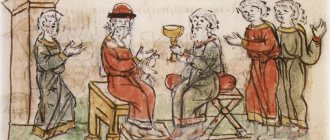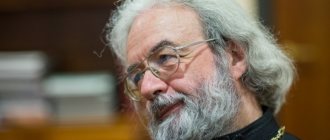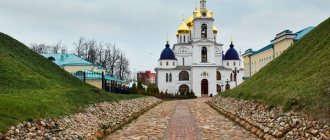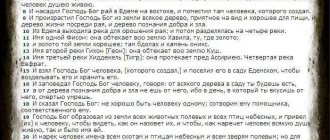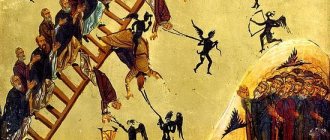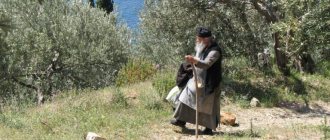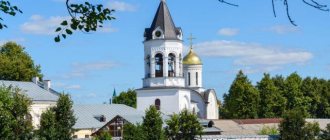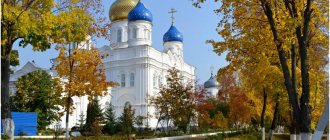Let's continue the conversation about church life. Archpriest Vladimir Vigilyansky, rector of the Church of the Martyr Tatiana at Moscow State University, told Pravmir about confession and communion, children’s repentance and the difficulties of adolescence, churching, severity and leniency towards human weaknesses.
Complaining about the frequency of confession is inappropriate
- Father Vladimir, sometimes in the evening you confess before communion, and until the morning you either quarrel with your family, or get angry with someone, or commit some other sin, and in the morning you go to confession again. And you name the same sins every time. Doesn't such frequent confession turn into a formal listing of sins? In Greece, for example, people go to confession less often; there the sacrament of confession is not strictly tied to communion. What problems arise with frequent and infrequent confession?
— I, like many modern clergy, am a supporter of frequent communion. At the same time, I believe that this practice should not be imposed on all parishioners; we must be judicious in this regard and not break the practice that has developed over decades. But if I am asked a question about the frequency of communion, and this happens all the time, with rare exceptions I advise: “As often as possible.”
Now - about confession. Indeed, for some church people who constantly attend divine services and regularly receive communion, it is possible to reduce the frequency of confession, but I have never met people who want this reduction. Moreover, when I invite parishioners, for example, on Bright Week to receive communion at every liturgy without a gastronomic fast and without confession, I see bewilderment and embarrassment in their reactions. I can explain why.
Firstly, it is no coincidence that some of the prayers of the Liturgy that the priest reads to himself are penitential. One of them says: “We bow down to You and pray to You, O good and philanthropic One, as if you have considered our prayer, cleanse our souls and bodies from all filthiness of the flesh and spirit, and give us an innocent and uncondemned standing...”
In another: “Grant us to partake of Your heavenly and terrible Mysteries, this sacred and spiritual Meal, with a clear conscience, for the remission of sins, for the forgiveness of sins... not for judgment or condemnation.” Before communion, the priest reads aloud a prayer: “I pray to You: have mercy on me, and forgive me my sins, voluntary and involuntary...”.
In short, the prayers call us to approach the Chalice, as far as possible, with a clear conscience, that is, prepared. But what could be more effective in this case than confession?
Secondly, the holy fathers call us to partake of the Mysteries of Christ with a sense of our own unworthiness, identifying ourselves with the “poor in spirit.” I know priests who speak their sermons, if their content is not a call to repentance, not before communion, so as not to destroy the repentant feeling of the communicants, but then, after dismissal, when they come out with a cross.
Thirdly, we live in a time when the concept of sin is leveled, passions are even declared to be the dignity of a person, a sign of his individuality, a manifestation of personal qualities. In this situation, confession puts everything in its place.
And finally, fourthly, and most importantly: the Lord, at the very beginning of His public ministry, came preaching about repentance, making it a condition for the revelation of the Kingdom of Heaven. If confession is the “ticket” to this Kingdom, then for us who hope to be with Christ for eternity, it should become a unique means of transformation. Complaining about the frequency of confession is inappropriate for a Christian.
“That’s not what people usually complain about.” The problem is that you confess often and regularly, but you don’t always have the determination to break with sin. There is no repentance. Many people are familiar with this. How can a priest teach a person today to repent in a large parish, where tens and hundreds of people come to confession, and it is not always possible to devote more than 2-3 minutes to a person? What if the priest himself is young and has no experience of deep repentance?
“We all know that in order to get rid of a recurring sin, you need to hate it. The priest must help the penitent by explaining what are the causes of this sin and what are its consequences. Sometimes this hatred is born from constant mention of him in confession.
People often complain to me that they are forced to repeat the same sins in confession. Then I propose to choose only one sin from the list, and the smallest, most insignificant one, and try to abandon it within a week. After a week, I ask you to continue the fight against this sin for a month and begin to fight another, also small sin. This positive experience of self-purification is very important for a person - he understands that it is possible to overcome sins.
It is difficult for me to speak for the priests of other temples. I will share the experience of our temple. Once a week, each clergyman has a day of duty, when you can come to him for a detailed confession or spiritual conversation. As a rector, I am on duty two days a week. In addition, there are email addresses for priests on the bulletin board where you can correspond with us.
As an experiment a year ago, I allowed my phone number to be made public in this ad so that people could call me in an emergency. Thanks to our parishioners who did not abuse empty calls. The experiment seems to have been a success. All these measures compensate for the lack of time for confession with a large influx of people on holidays, Saturdays and Sundays.
— How to prepare a child for confession, explain to him what to repent of? If you simply tell him: “Repent for not listening to your mother,” you can only turn him away from confession.
— An important task of parents and the priest is to strengthen in the child the concepts of good and evil, what can and cannot be done and said. Confession is the best means for this. It is necessary to teach a child to ask for forgiveness for unseemly actions, but for some it can be very difficult to do this.
Conversation on this topic is very useful. Sometimes I list the sins of Judas - betrayal, envy, theft, unwillingness to repent - and warn the children never to commit them. Sometimes I ask a child if he likes it when people snitch on him, when they hurt him, when they call him names, when they don’t make friends with him, when they don’t share toys with him, when they don’t help him. And after that I put him in the place of those who do this.
Of course, it is very difficult to persuade a child to have a frank conversation; it is hard work and requires skill. There are three environments in which a child behaves consciously and unconsciously in different ways: family, school, yard (comrades). We need to help put it in the context of the circumstances of these environments.
It must be remembered that in the process of socialization, a child easily changes roles in relationships with peers, older and younger brothers and sisters, with father, mother, grandmother, and different teachers. I would advise parents and priests to read literature about child psychology, especially about children's fears, which become the basis for sinful habits.
Another miracle in Bortsurmany
Having barely waited for the next holiday, I began to get ready for a new long journey - to the city of Ulyanovsk, in the hope that in the Simbirsk archive I would find information about the Vigilyansky priests, whose fates still had many questions. I already dared to hope that on this path I would find myself under the wing of God, under intercession, under guidance, and I believed that the journey would not be fruitless.
In the Simbirsk archive, time again flowed differently - I called this movement “forward, into the past”: the deeper I plunged into the past, the closer I moved towards myself, towards something important in my life. A new joy awaited me: the clergy registers of the churches of the Kurmysh district for all the years of the 19th century had survived! Many believed that these documents were burned in a fire; In addition, due to the reorganization of provinces into regions and counties into districts, confusion arose, and it was completely unclear in which archive to look for precious information. But they were here, and I read them!
Clergy registers are handwritten books in which information about churches and clergy was entered. Leafing through them, you instantly find out everything - the years of the priest’s life, his place of birth and study, information about other churches where he served, his awards, property, complete family composition, dates of birth of household members and even the number of “instructions” - sermons that he delivered ! It was a treasure trove of information: I almost completely restored our family genealogy by date, found out the names of the wives and children of the priest-ancestors, traced side branches, even saw the handwritten signatures of my grandfathers - their handwriting, evidence of the living breath of the past. Fluent, oblique, fast - from the great-great-great-grandfather: “Priest Pavel Ivanov of Vigilyansky put his hand.” Slow, written with a trembling hand - news from 1838 from the holy righteous Alexy: “Priest Alexey Petrov Gneushev, priest of the Assumption Church ...” - a voice from afar, a meeting! And the imprint of a very recent, by the standards of history, era - the signature of my great-great-grandfather from the family album, from which my search began: a few months ago I was perplexed who he was, and now I peered into the illegible letters written by his hand, and marveled at the feeling of the door swinging open ...
Finally, the mysterious connection of our family branch with the “Vladimir” Vigilyanskys was explained: great-great-great-grandfather Pavel studied at the Vladimir Seminary and was a native of these lands, but after studying he was sent to the distant Simbirsk province, to Bortsurmany, where he married the saint’s granddaughter and became his successor in the Assumption Church. So the Vigilyanskys settled in the Kurmysh district for almost a century.
But the main thing is that I found out where Pavel Vigilyansky is buried. During Soviet times, the church cemetery was completely destroyed. Thanks to popular veneration, only one grave survived - “Father Alexei”: it turned out that, preserving the memory of the righteous wonderworker and caring for his grave, the village residents saved from ruin and preserved for us his holy relics, which later, after his glorification, were destined gain the Orthodox Church. But the rest of the burials, alas, were razed to the ground, and it has not yet been possible to resurrect their memory. Now, from archival documents, I knew that Father Paul bequeathed to bury himself behind the altar of the Assumption Church, to the left of the grave of St. Alexis. This story was preserved thanks to a sign that was revealed on the eve of the installation of Pavel Vigilyansky’s tombstone. A certain stove maker Gerasim Chudakov heard a voice that told him to erect a monument not close, but at some distance from the grave of Father Alexy, because the saint was destined to “come out with his relics” in the future, and the tombstone of his successor could be damaged.
So, I was entrusted with restoring the grave of my great-great-great-grandfather. Then I realized that I was obliged to take into my own hands another difficult and big matter - to try to win back the temple in which my great-great-grandfather Alexei Pavlovich served from the club in Kurmysh, and return it to the Church, and then think about its restoration.
I decided to return back through Bortsurmany: I could not help but take advantage of the opportunity to again fall before the relics of the saint and ask for his help in new matters. Hospitable Father Andrei, the rector of the church, sheltered me in his house for the night, and the next morning we went to service together: I again found myself on a holiday - it was the day of the Kazan Icon of the Mother of God. After the Liturgy, Father Andrei opened for me a shrine with the relics of the saint...
And then something happened to me that I decided to tell only my mom and dad - my experience was so intimate, deep, and otherworldly. I stood at the relics and did not know what words to pray: I clearly caught this feeling - the powerlessness of words, their inaccuracy and scarcity to express a whole tangle of my thoughts and feelings, from gratitude to a prayer that the saint would always be with me. And in a state of this verbal weakness, dumbness, I deliberately descended into my depths - to where words have not yet been born, where nothing is named, in order to speak with Saint Alexy directly from there, in order to convey my feeling as it is, in this original, newborn , unformed, undistorted form. And the saint answered me - I knew this, because something happened to my body. My tears flowed, they actually flowed - in such an endless and generous stream that my jacket, scarf and everything that was under them were thoroughly soaked on my chest. Now I’ll say a strange thing: I didn’t cry! It was not at all like ordinary crying, like what happens to us from an overabundance of feelings, from the severity of emotions, from heartfelt emotion. Tears flowed naturally - as a reaction to something alien, incomprehensible and unprecedented. Apparently, the body simply does not know other ways to respond, does not understand how to behave, how else it can express itself in this meeting with the incorporeal, immaterial, extraterrestrial... with what is probably called grace...
I was driving home with new evidence of a miracle, and I was again overcome by the already familiar double feeling: gratitude mixed with fear, with a keen awareness of my responsibility and duty, which calls for reciprocal steps on my part, for reckless service to God. I was afraid that I couldn't do it. On the way there were Vyazniki: this geographical name became symbolic for me, speaking, linking everything with everything - that zero point from where my new life began. Of course, I could not pass by Lev Valerianovich Vigilyansky, sent to me by the Lord Himself: now I already knew the answers to all the questions that we both asked ourselves in June, sitting in the kitchen. And here we are again sitting at the same table, but now together we are marveling at the wonderful finds.
And then winter came, and for many months I lived in anticipation of a new meeting: I missed the Bortsurmans and mentally returned to them. At the end of April, as soon as the snow melted, I finally took my youngest daughter Lisa there - I was lucky enough to find an empty house right opposite the temple: we woke up in the morning, looked out the window and did not believe our happiness.
While still in Moscow, I arranged a meeting with Vladyka Silouan, Bishop of the Lyskov diocese: new tasks required his blessing and participation. I knew that on May 4, Bishop Silouan would serve the festive Liturgy in Bortsurmany, and I hoped to catch him after the service. But on the very day of the holiday, it turned out that Vladyka had already allocated a whole hour in his schedule to talk with me at Father Andrei’s house, even before the start of the service. It was a great mercy. I told him all the details of finding my ancestors, showed him the family album - the same one that had recently raised so many questions and about which I now knew everything, shared my sadness about the fate of the Kurmysh temple, desecrated by club discos, told about the found grave of priest Pavel and about our desire to resurrect her. The attention and responsiveness of the Lord exceeded all my expectations. He supported me in all my endeavors, gave his blessing to all the necessary steps in returning my memory. And during the sermon after the Divine Liturgy, he repeated my story from the pulpit of the church to all its parishioners and guests and even introduced me as the heir of St. Alexius and a witness to his new miracles. I again felt the undeservedness of these honors and again understood that I was being given immeasurably more than what I dared to ask for. On the same day, Vladyka introduced me to the head of the Pilninsky self-government, and he promised me that in a matter of time, already this year, the temple in Kurmysh would return to its true purpose.
Teenagers for Pastoral Theology - Terra Incognita
“And a teenager can know theory well, read books on moral theology, and at the same time easily sin and treat confession frivolously...
— Teenagers are a special matter. Much could be said here. Unfortunately, for pastoral theology this is terra incognita. The priest should remember that this is a borderline age when a young man either remains in the temple forever or leaves it for many years. Methods of clergy that are possible in relationships with children and appropriate with adults are not suitable here.
On the one hand, we must treat teenagers with the utmost respect, be lenient with their attempts to seem like adults, with their desire to establish themselves as individuals; on the other hand, we must be principled towards their nihilism, their desire to overthrow the authorities and values of the “adult world.” Many of them do not realize, with all the feeling of being individuals, that this is the age when they psychologically become members of teenage groups, whose interests become dominant in behavior. Parents and priests need to know that teenagers are very acutely aware of the lack of love (hence the feeling of loneliness) and fetishize the concepts of friendship and camaraderie.
I advise some teenagers before going to bed, while already in bed, to remember the day they lived and think about whether they did anything for God and for people. If you haven't done anything, then the day will be wasted.
A separate topic is sexual maturation and the interest of teenagers in “forbidden” pictures, films and articles on the Internet. It is necessary to clearly separate the desire of children to love someone and to be loved from physiological problems. Teenagers are especially reserved on this issue. Under no circumstances should the priest ask the child about any personal details, but he is obliged to talk about this in a confidential manner in streamlined terms, citing examples and cases as if with other children.
We all know that no one - neither school, nor family, nor society - makes any effort to instill chastity. “Sins of youth,” we assume, are the main reason our children leave the Church.
Bortsurmans. I was found
And then I went further and deeper, another generation down - to a village with the ancient name Bortsurmany: it was there that my great-great-grandfather Alexy was born. His father, Priest Pavel, my sixth-generation grandfather, served in Bortsurmany, and the Assumption Church in this village, I knew, had been revived and is functioning.
It was necessary to drive some 25 kilometers for the time to finally cancel. I came to the Promised Land, where we all come from. Green spaces, village houses, outskirts, goats, roosters and the road, and the hill in the distance, and the snow-white temple on the hill - absolutely, impossibly beautiful. It was as if I was returning home after a long separation - this feeling of recognition, it cannot be confused with anything. But I couldn’t even imagine what new shock awaited me here.
I drove up to the temple to the sound of bells ringing. There were a lot of cars and people around, joyful, dressed up, obviously gathered here for a special occasion, because it was a weekday, Tuesday. The polyeleos all-night vigil was ending, and I impatiently rushed to ask my grandmother behind the candle box what kind of celebration was happening here today. It turned out to be the eve of the patronal feast of the Discovery of the relics of the righteous Saint Alexy of Bortsurman, the priest of this church - an ascetic, seer, healer, miracle worker. And his relics rest right here in the temple. I saw a reliquary decorated with flowers and fell to the relics of an unknown old man - I had never even heard his name. Then I bought a book with his life in a shop and drove off to a small forest nearby to camp here for the night in a tent: surrounded by the miracles taking place, I was no longer afraid of anything. Before going to bed, I took out the life, and my gaze naturally fell on the lines that made my heart beat: “Nine years before his death, Father Alexy left the state and transferred his place to Pavel Vigilyansky, who was married to his granddaughter from his eldest daughter Nadezhda.” So, in one day I found a genealogy up to the eighth generation: Priest Alexy Gneushev [1], an unfamiliar wonderful saint, whose memory was honored today, turned out to be my grandfather with five “great-greats”.
How can I tell you what I felt lying with a flashlight in a dark tent, in the forest at night, on the outskirts of a remote village?
That I’m not going, but they’re leading me, that I wasn’t looking, but they found me? The whole chain of “accidents” along this path unfolded before me again, all its intermediate stops and half-stations, when the final destination was not yet visible, and only an inexplicable distant call was heard, to which it was impossible not to succumb. The holy grandfather took me by the hand - back there, in distant Moscow - and brought me to him through Vyazniki, through chance finds and meetings, so that I could not close my eyes now, so that I lay in my sleeping bag and repeated: “Wonderful is God in His saints! ", "Holy righteous Father Alexis, pray to God for us!", "Glory to God!". It was like being reborn. I read about the miracles of the saint described in his life, and I understood that one of them, not included in the book, was happening right now and was happening to me.
The next day - August 17, 2016 - I will never forget. The entire hill around the temple was filled with people who could not fit inside: the Liturgy was served right on the street, in the rays of the rising sun. Vladyka George, Metropolitan of Nizhny Novgorod and Arzamas, flew to Bortsurmany by helicopter, and he was concelebrated by four bishops and priests who had come from all over the diocese. It seemed to me that I was at a feast in the Mountain World, that all boundaries had expanded, and there was no longer either time or space. I returned to myself, to the state in which, probably, only a person should exist - to a deafening experience of faith: with such strength and depth it - in my negligence - could only be revealed when meeting with a genuine miracle, bestowed by grace and love of God, undeservedly, completely for nothing.
Sister Lena recognized me in the crowd by the expression of shock on my face - probably it could not be ignored. We hugged and wanted to cry - our emotions were so piercing and acute. This meeting did not hide from the journalists of Nizhny Novgorod television - I told my story in front of the camera to testify to the miracle and glorify God. After the service, I made my way to Metropolitan George, who has known my parents for a long time and has been friends with them - of course, I could not help but share my deafening news with him. He blessed me, put his hand on my head and said: “Well, where are dad and mom? I am waiting for them at the service here in Bortsurmany next August, in a year: now, after such a miracle, this holiday will be incomplete without them. Welcome to visit."
But dad and mom still didn’t know anything and were worried in distant Moscow, wondering where I had disappeared to again. From Bortsurman, of course, I went straight to them, and first of all we held a home thanksgiving prayer service in front of the icon of the holy righteous Alexis, which I brought from his relics, with the reading of an akathist and a canon in his honor. And then we couldn’t stop talking, marveling at God’s Providence and His inscrutable ways...
August ended, ordinary Moscow work life began, but I felt that it would never be the same as before. Recent miracles that fell from the sky turned my world upside down, transformed it with an unearthly light, and it was impossible to get used to this light. The feeling of endless gratitude to God emphasized and aggravated the feeling of my own smallness, my unworthiness and the absolute undeservingness of the miracle that happened to me - it happened like a volcano, like an earthquake, like the heavens opening up. I understood that I would never be able to come up with any equal answer to the blessing of God that I had received in my life. I felt that now I must somehow serve, bring some benefit, and I began to pray that the Lord would show me exactly how I could be useful, so that He would tell me what to do now.
We need to encourage parishioners to ask any questions.
— What books would you advise beginners to start reading patristic literature with? If something is unclear to a parishioner from the Holy Fathers or in Scripture and even raises doubts, should he share it with the priest? Should you be afraid to ask awkward or stupid questions?
— There are no provocative, inconvenient and stupid questions, there are provocative and stupid answers. During the period of my churching, I remember my questions and wise answers from Archimandrite Kirill (Pavlov), Metropolitan Anthony of Sourozh, and other clergy. Priests need to encourage parishioners to ask any questions. This is very important for people. Another thing is that there are almost no universal answers in everyday affairs “for everyone” - each person has his own circumstances, his own context of life. What is useful for one is harmful for another.
I became a church member when church books, typewritten or published in the West and here before the revolution, were passed from hand to hand. There wasn't much choice. But I was lucky - I almost always came across very good ones: scattered volumes of the lives of saints. Demetrius of Rostov and the works of St. John Chrysostom, “Philokalia”, Abba Dorotheus, “Optina Hermitage and Its Time” by I. Kontsevich, “Frank stories of a wanderer to his spiritual father”, “Father Arseny”, Russian religious philosophers of the early 20th century. Now I would recommend, in addition to these books, any books by Metropolitan Anthony of Sourozh and Elder Paisius of the Holy Mountain, the books “Elder Silouan of Athos”, “Invisible Warfare”, “Spiritual Meadow”...
“I have become very weak, and I physically cannot bear this penance”
— Today, strict penances are not practiced. Even for sins for which, according to the canons, excommunication from communion is expected for years, today people are excommunicated for several weeks, or at most several months. Is only oikonomia really appropriate in our time? Or are there cases when acrivia is needed?
— In my opinion, strictness must be observed when it comes to church dogmas, deliberate deviations from the fundamental norms of church life: witchcraft, blasphemy against the Holy Spirit, deliberate rejection of the foundations of faith. Condescension towards human weaknesses can be used when a sinner sincerely laments his sins and has a firm intention to improve. In some cases, I allow a person not to be allowed to take communion for a year or more (when he sincerely repents, but due to human weakness cannot promise to part with sin forever), except for Holy Easter and the Nativity of Christ. This does not apply to a person living in fornication.
I remember how they asked the elder Archimandrite Seraphim (Tyapochkin) to give penance for some sin, and he gave three prostrations within a week. Then they asked him why the penance was so short and simple. He replied: “I have become very weak and I physically cannot bear this penance.”
